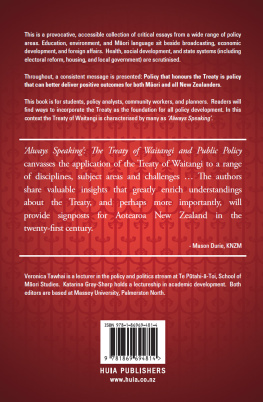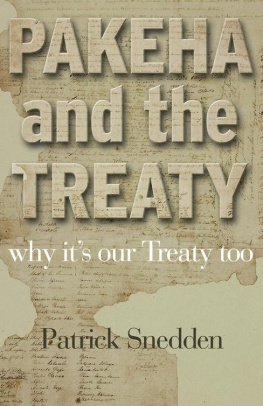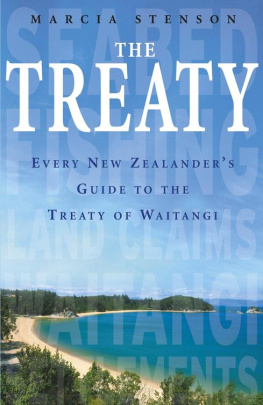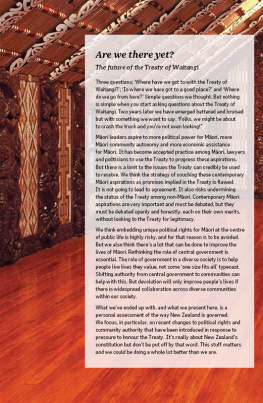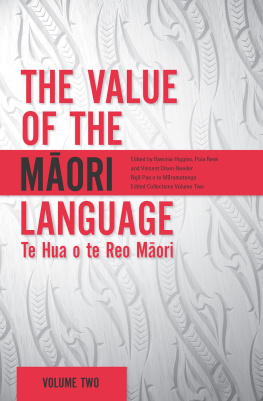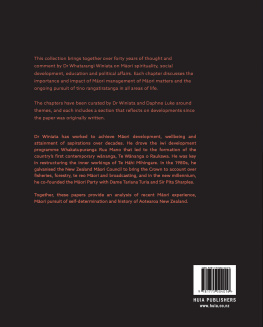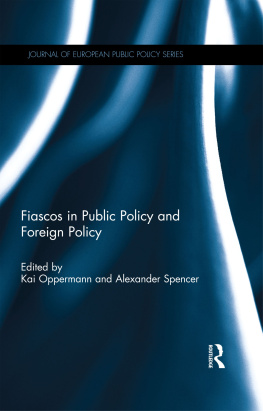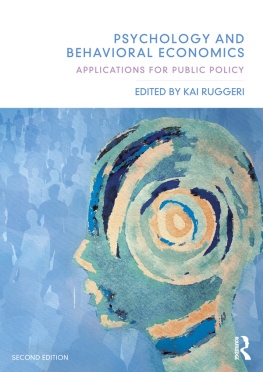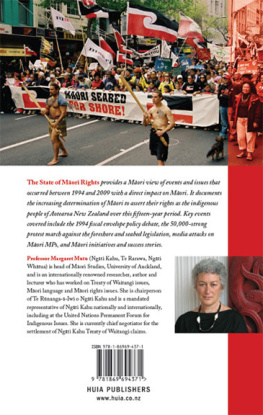


First published in 2011 by Huia Publishers
39 Pipitea Street, PO Box 17335
Wellington, Aotearoa New Zealand
www.huia.co.nz
ISBN 978-1-86969-481-4 (print)
ISBN 978-1-77550-020-9 (ebook)
Copyright the authors 2011
Cover artwork: Tuapeka by Jermaine Reihana
Ebook conversion 2021 by meBooks
This book is copyright. Apart from fair dealing for the purpose of private study, research, criticism or review, as permitted under the Copyright Act, no part may be reproduced by any process without the prior permission of the publisher.
National Library of New Zealand Cataloguing-in-Publication Data
Always speaking : the Treaty of Waitangi and public policy / edited by Veronica MH. Tawhai and Katarina Gray-Sharp.
ISBN 978-1-86969-481-4
1. Treaty of Waitangi (1840) 2. Maori (New Zealand people)
Government policy. [1. Tiriti o Waitangi. reo 2. Mana whakahaere. reo
3. Torangapu. reo] I. Tawhai, Veronica MH. (Veronica Makere Hupane)
II. Gray-Sharp, Katarina. III. Title.
320.60993dc 22
Published with the assistance of Te Ptahi--Toi, School of Mori Studies, Massey University, and Manu Ao Academy

He mihi tnei ki te hunga e kaingkaunui ana ki te Tiriti o Waitangi,
me tna whakatinanatanga hei tpapa i te ao trangap.
Koutou kua para i te huarahi, e kore e warewaretia.
Ki ng kaituhi o te puka nei me ng kaitautoko hoki, tn koutou.
Heoi, tn ttau.
Veronica thanks her whnau for their support in the development of this publication.
Katarina dedicates her contribution to her parents, who always believed in her.
Contents
Professor Sir Mason Durie
Professor Taiarahia Black
Associate Professor Huia Tomlins-Jahnke and Krystal Te Rina Warren
Associate Professor Papaarangi Reid
Dr Maria Bargh
Dr Huhana Smith
Associate Professor Janine Hayward
Veronica MH Tawhai
Dr Teorongonui Josie Keelan
Dr Christine M Kenney
Dr John Waldon
Dr Kathie Irwin and Kim Workman
Dr Leonie Pihama and Carl Mika
Katarina Gray-Sharp
Dr Colin Knox
Haami Piripi
Judge Heemi Taumaunu
Associate Professor Manuka Henare
Professor Sir Mason Durie
Tn koutou katoa.
Always Speaking: The Treaty of Waitangi and Public Policy canvasses the application of the Treaty of Waitangi to a range of disciplines, subject areas and challenges in the twenty-first century. Whether or not the signatories to the Treaty in 1840 had public policy in mind, there can be little doubt that they were all too well aware of the impending societal changes that were about to transform Aotearoa New Zealand. New technologies, a written language, a cash economy, national governance, and individualised land titles were only some of the radical shifts that confronted Mori. Then, adaptation was largely seen from a coloniser perspective. Notwithstanding the guarantees contained in the Treaty, the general expectation was that Mori should embrace the Westminster traditions and become accustomed to a British way of life.
However, treaties are never uni-directional. Indeed the whole purpose of a treaty is to establish a basis for trust and to identify ways in which co-operation can proceed in order to deliver mutual benefits without extinguishing either customary experience or ambitions for a new social order. Those two broad expectations do not always sit easily alongside each other. But over time, and after a fair amount of trial and error, there has been recognition that the Treaty of Waitangi provides a touch-stone upon which two world views, two sets of traditions, and two understandings can create a society where indigeneity and modern democratic practices can meet.
Although the interface between the two parameters has yet to be fully understood, the chapters in this book are evidence that the interface has the potential to be a rich source of innovation and inventiveness. Several facets of public policy are explored by authoritative authors highlighting both shortcomings, where the Treatys promises have yet to be realised, and opportunities, where indigeneity might be better represented in policies and programmes devised by the state.
This timely publication has affirmed that the importance of the Treaty of Waitangi lies less in its historical significance and more with a relevance to contemporary times. That should not be too surprising. The Treaty of Waitangi was never about perpetuating the past; nor was the focus ever intended to dismiss indigenous perspectives. Essentially the Treaty was about designing a future for Aotearoa New Zealand where Mori world views, rights, and leadership would be reflected in the day to day life of the democratic nation and the ways in which public policies would be determined. Always Speaking: The Treaty of Waitangi and Public Policy continues that theme of present day relevance and in the process provides a wide range of Mori perspectives across an equally wide range of current concerns. The authors have shared valuable insights that will greatly enrich understandings about the Treaty, and perhaps more importantly, will provide signposts for Aotearoa New Zealand in the twenty-first century.
Kia mia,
Mason Durie, KNZM
Introduction
The statement that the Treaty speaks infers a living organism with a life force of its own indivisible, and holistic. This life force exists not by its principles alone, but also through its word (spirit) and its accruing mana.
Dame Mira Szaszy
Although much has been written about the relevance of the Treaty of Waitangi to policy-making in New Zealand, The collection of chapters in this volume provides a picture of the Treaty of Waitangi as it is written into public policy in New Zealand: where is it acknowledged; where it is yet to be seen; ongoing developments; and the challenges ahead. Although there are areas of difficulty, the picture is one of hope, particularly in the many ideas and opportunities presented as to where these developments might begin.
The common message underpinning Mori efforts towards the Treaty of Waitangi in public policy is clear policy honouring the Treaty is policy that can better deliver positive outcomes for Mori communities, and thereby to wider New Zealand. Although some progress has been made, past governments performance in ensuring the rights and wellbeing of Mori is protected has been disastrous. There is yet to be full recognition that effective public policy for Mori is built upon Mori priorities, cultural values and aspirations. Perhaps in response to this, there is in this book a distinct move away from Article Threes equal citizenship, which has tended to result in an equal treatment approach. Rather the focus has shifted towards Article Ones kwanatanga, the meaning of good governance, and how Mori can greater monitor and influence the government in their policy-making functions.
Next page
